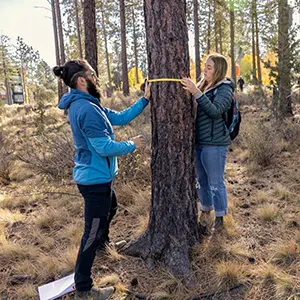
Natural Resources
Natural Resources
Make a difference in the natural world.
Degree Type
- Bachelor of Science
- Honors Bachelor of Science
- Minor
College
College of Forestry
Catalog Link
Natural Resources
In this interdisciplinary degree, you’ll study science, management and policy topics with expert faculty who have experience in research, public agencies and industry. You’ll examine the complex interactions that occur in the natural world and how human activities can influence them. Your courses will include ecology, fish and wildlife, watershed management, habitat restoration, environmental ethics and law, sociology and resource policy.
The OSU-Cascades campus serves as a living laboratory for learning about native plants and local ecosystems. Our natural laboratory also includes the Deschutes National Forest and other public lands close to campus.


Small class sizes
Our program fosters a sense of community that’s hard to find at larger campuses.

Faculty experts
Our faculty are in the classroom — and out in the world — making an impact.

Hands-on learning in the field
Get ready to go out there. Field trips are built into the coursework.
Program Details
Fish and Wildlife Conservation Option
This option prepares students for a career in the broad arena of natural resource and wildlife conservation. It emphasizes understanding the relationship between animal species and their habitat requirements and the ability to apply this knowledge to the management of ecosystems as a means of conserving fish and wildlife.
Individualized Specialty Option
The Individualized Specialty Option (ISO) is a student-designed option that allows a student to tailor their academic program to specific goals or interests. In consultation with their academic advisor, students will develop a program of study that meets their goals, as well as program requirements. The student is required to submit a proposal for approval by the Natural Resources Program Director. Students should contact their assigned academic advisor for information on developing an Individualized Specialty option.
Policy and Management Option
This option will prepare students for careers in the broad arena of natural resource and environmental conservation, with an emphasis on the social and political aspects of resource issues.
Degree Requirements
A total of 180 quarter credits are required to graduate, including 60 upper-division credits. Requirements include:
- OSU Core Education
- Natural resources major requirements
- Specialization option (students must select an option):
- Fish and Wildlife Conservation
- Policy and Management
- Individualized Specialty - for students approved to create their own option
- Electives as needed to meet 180 total college credits
Planning and Resources
OSU-Cascades COCC Transfer Guides
College of Forestry Transfer Guides for Oregon Community Colleges
Using the following course forecast information students will plan ahead and work with their advisor to create and update academic plans.
Once you complete this program, discover all the learning outcomes you'll achieve.
Natural Resources Minor (27 credits)
Students majoring in other programs at OSU-Cascades can choose to complete the natural resources minor. The minor is intended to provide a broad exposure to the natural resources field. It offers course work that integrates a number of natural resources disciplines.
Natural Resources Minor Curriculum
Careers
What comes after graduation?
Natural resources graduates go on to restore landscapes, protect wildlife and shape policy for healthier communities. Your degree equips you to lead change in government, nonprofits or the private sector, and prepares you for advanced study.
- Aquaculturist
- Arboriculturist
- Bioresource Engineer
- Cell Biologist
- Conservation Officer
- Conservationist
- Consultant
- Consumer Counselor
- Ecologist
- Editor
- Educator
- Environmental Lawyer
- Farmer/Rancher
- Field Representative
- Fire Scientist
- Fisheries Biologist
- Food Inspector
- Forester
- GIS Specialist
- Landscape Designer
- Lobbyist
- Naturalist
- Park Manager
- Park Ranger
- Plant Scientist
- Policy Analyst
- Rangeland Management Specialist
- R&D Manager
- Research Technician
- Soil Scientist
- Surveyor
- Toxicologist
- Waste Management Specialist
- Water Quality Specialist
- Wildlife Biologist
- Writer
- Urban/Regional Planner
Field Technician, U.S. Geological Survey
Rangeland Ecologist, Bureau of Land Management
Safety Manager, Weyerhaeuser
Project Manager, Sustainable World Coalition
Biologist, U.S. Fish and Wildlife Service
Conservationist, U.S. Department of Agriculture
Environmental Health Specialist, Deschutes County Health Services
Program Analyst, U.S. Forest Service
Water Resources Consultant, GSI Water Solutions
Digital Content Strategist, BioProcess International
Consultant, Coast Range Timberland Management
Field Editor, Werner Publishing
Upper Deschutes Watershed Council
US Forest Service
Discover Your Forest
Deschutes River Conservancy
Sunriver Nature Conservancy
High Desert Museum
Bureau of Land Management
Oregon Department of Fish and Wildlife
Deschutes Land Trust
OSU-Cascades
American Bear Association
Courses
What types of classes will I attend?
- Forest Types of the Northwest
- Fish and Wildlife Conservation
- Managing Natural Resources for Future
- Wildland Plant Identification
- Desert Watershed Management
- Sustainable Communities
- Aquatic Entomology
- Endangered Species
- Management of Pacific Salmon
- Rangeland Management
- Environmental Politics and Policy
making decisions on behalf of the environment
Natural resources students work with top researchers to tackle environmental challenges. Student Kaitlin Rodriguez joined researcher Dr. Skuyler Herzog to study Central Oregon rivers and how they best interact with their floodplains. The researchers give restoration suggestions to land owners and land management agencies. Undergraduate research is one of the best ways to get professional experience. It stands out in a job interview or on a graduate school application.
research on wildlife crossings
As the human population increases, animals need help crossing busy highways to reach their habitats. Corrinne Oedekerk, an OSU-Cascades natural resources alumna and researcher in the HERS Lab, is studying how and when animals use the wildlife crossing structures. Check out footage from the wildlife cam and see what's crossing!
See yourself here
Take a virtual tour of campus
Request More Info
Contact Us
We're here to help! Future students can connect with an OSU-Cascades admissions advisor for admission and program questions.